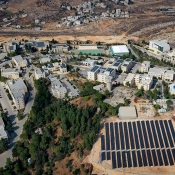University Hosts Talk on International Environmental Protection Treaty
On October 10, the Institute of Law at Birzeit University, in partnership with the Konrad Adenauer Stiftung and the Palestinian Environmental Quality Authority, held a conference discussing the legal and environmental ramifications of Palestine’s admission into the Basel Convention.
The conference, “The Basel Convention on the Control of Transboundary Movements of Hazardous Wastes and Their Disposal, and the Legal Implications of Palestine’s Accession,” featured speakers detailing the convention’s requirements, process of entry, aims, and effects on the legal and environmental practices of Palestine.
The conference, which was chaired by the senior researcher at the Institute of Law, Dr. Mustafa Mar’i, started with a speech by the Acting Director of the Institute of Law, Dr. Mueen Barghouthi, who noted the progress that Palestine has made with regard to joining international treaties and agreements. He said, “Palestine is part of a substantial number of international treaties and agreements. However, we still have a long way to go. We don’t have highly-trained experts in international law, for example.”
The next speaker, Head of the Palestinian Environmental Quality Authority, Dr. Adala Al-Teri, commended the pan-organizational effort that went into the signing of international and regional treaties. She added, “This is a multi-organizational, multi-step process that requires the attention and effort of all organizations and institutions in the state.”
Dr. Al-Teri said that the reason for joining the Basel Convention, and other international agreements, is twofold: “Protection of the environment against the illegal activities of the Israeli occupation, such as the dumping of hazardous waste materials in Palestinian lands, and as an exercise of our role as sovereign and rightful owners of this land.”
The legal counsel for the Environmental Quality Authority, Mr. Murad Madani, who detailed the legal intricacies and complexities of the Basel Convention, took pride in the fact that the Institute of Law is the first private legal institute to approach the subject of international agreements and hold discussions over them.
With regards to the Basel convention, Mr. Madani first provided a general definition of international agreements and their history, then funneled the focus of his speech towards the Basel Convention. He said, “The Basel Convention came as a result of the developed countries’ attempts to counterunlawful, unethical waste management, ” and further added, “International conventions and agreements provide us with mechanisms of assigning liability, a way to bring violations to courts of justice.”
The Environmental Quality Authority liaison officer to the Basel Convention, Mr. Yaser Abu Shanab, provided an explanation of the technicalities of the convention. Explaining the particulars of the political aims of joining the treaty, Mr. Abu Shanab said, “This treaty reinforces Palestine’s role in international conventions and agreements and allows us to report on and reveal Israel’s responsibility in polluting the Palestinian environment with hazardous waste materials.”
Mr. Abu Shanab also detailed the technical aims of signing the treaty, adding, “It incentivizes our organizations to follow globally-standard procedures in waste management, and provides us with the ability to control the traffic of hazardous waste across borders. It also increases our chances of catching hazardous and chemical waste material smuggling attempts.”






